新概念英语口语入门Lesson 4 Foods
新概念英语第4册课文(中英文对照)
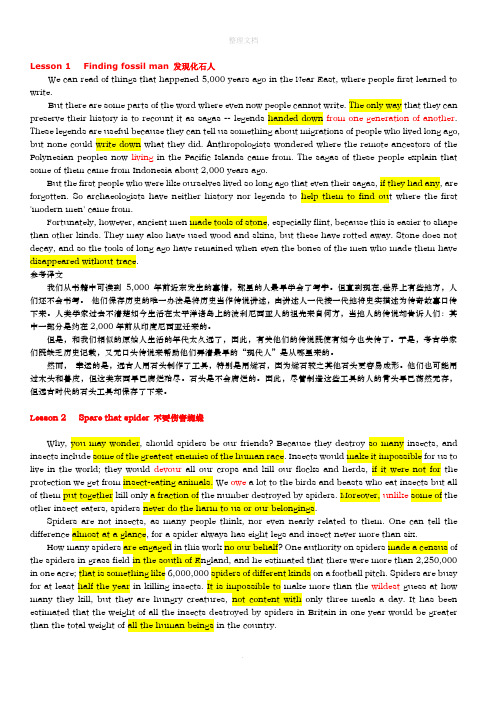
Lesson 1 Finding fossil man 发现化石人We can read of things that happened 5,000 years ago in the Near East, where people first learned to write.But there are some parts of the word where even now people cannot write. The only way that they can preserve their history is to recount it as sagas -- legends handed down from one generation of another. These legends are useful because they can tell us something about migrations of people who lived long ago, but none could write down what they did. Anthropologists wondered where the remote ancestors of the Polynesian peoples now living in the Pacific Islands came from. The sagas of these people explain that some of them came from Indonesia about 2,000 years ago.But the first people who were like ourselves lived so long ago that even their sagas, if they had any, are forgotten. So archaeologists have neither history nor legends to help them to find out where the first 'modern men' came from.Fortunately, however, ancient men made tools of stone, especially flint, because this is easier to shape than other kinds. They may also have used wood and skins, but these have rotted away. Stone does not decay, and so the tools of long ago have remained when even the bones of the men who made them have disappeared without trace.参考译文我们从书籍中可读到5,000 年前近东发生的事情,那里的人最早学会了写字。
裕兴新概念英语第二册Lesson4第4课笔记讲义
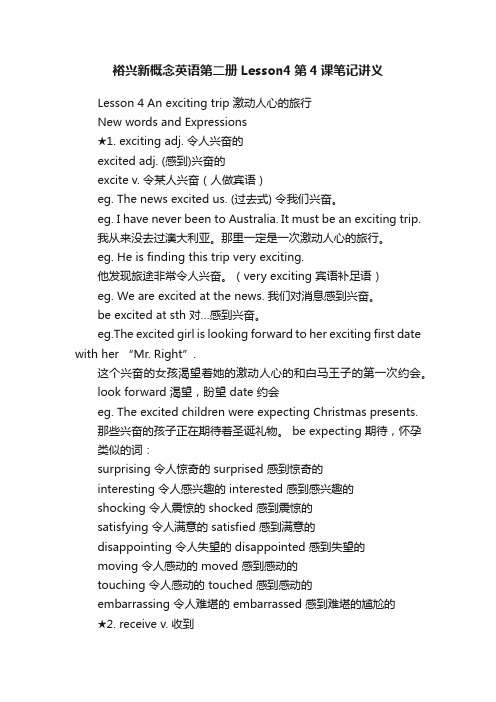
裕兴新概念英语第二册Lesson4第4课笔记讲义Lesson 4 An exciting trip 激动人心的旅行New words and Expressions★1. exciting adj. 令人兴奋的excited adj. (感到)兴奋的excite v. 令某人兴奋(人做宾语)eg. The news excited us. (过去式) 令我们兴奋。
eg. I have never been to Australia. It must be an exciting trip.我从来没去过澳大利亚。
那里一定是一次激动人心的旅行。
eg. He is finding this trip very exciting.他发现旅途非常令人兴奋。
(very exciting 宾语补足语)eg. We are excited at the news. 我们对消息感到兴奋。
be excited at sth 对…感到兴奋。
eg.The excited girl is looking forward to her exciting first date with her “Mr. Right”.这个兴奋的女孩渴望着她的激动人心的和白马王子的第一次约会。
look forward 渴望,盼望 date 约会eg. The excited children were expecting Christmas presents.那些兴奋的孩子正在期待着圣诞礼物。
be expecting 期待,怀孕类似的词:surprising 令人惊奇的 surprised 感到惊奇的interesting 令人感兴趣的 interested 感到感兴趣的shocking 令人震惊的 shocked 感到震惊的satisfying 令人满意的 satisfied 感到满意的disappointing 令人失望的 disappointed 感到失望的moving 令人感动的 moved 感到感动的touching 令人感动的 touched 感到感动的embarrassing 令人难堪的 embarrassed 感到难堪的尴尬的★2. rec eive v. 收到receive sth from sb 从谁那收到什么东西receive a letter 收到一封信 receive a present 收到一份礼物receive a phone call 接到一个电话 receive good education 得到良好的教育eg. You will receive a warm welcome whenever you come to my home.无论你什么时候来我们家你都会得到热烈欢迎的。
新概念英语第四册知识点整理
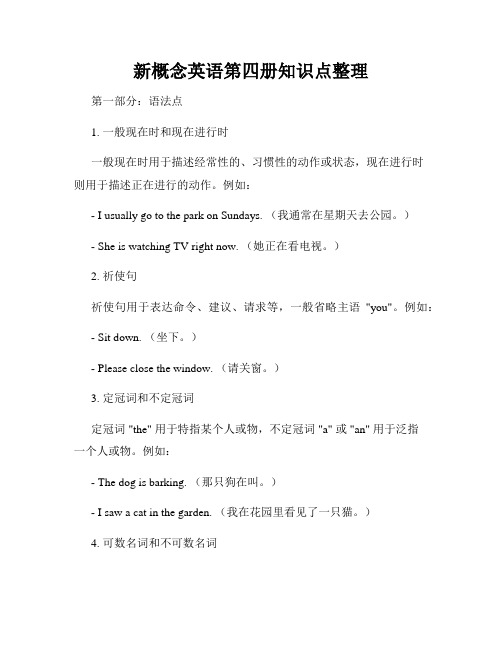
新概念英语第四册知识点整理第一部分:语法点1. 一般现在时和现在进行时一般现在时用于描述经常性的、习惯性的动作或状态,现在进行时则用于描述正在进行的动作。
例如:- I usually go to the park on Sundays. (我通常在星期天去公园。
)- She is watching TV right now. (她正在看电视。
)2. 祈使句祈使句用于表达命令、建议、请求等,一般省略主语"you"。
例如:- Sit down. (坐下。
)- Please close the window. (请关窗。
)3. 定冠词和不定冠词定冠词 "the" 用于特指某个人或物,不定冠词 "a" 或 "an" 用于泛指一个人或物。
例如:- The dog is barking. (那只狗在叫。
)- I saw a cat in the garden. (我在花园里看见了一只猫。
)4. 可数名词和不可数名词可数名词表示可以计数的事物,可以用数词修饰;不可数名词表示不可分割的事物,不能用数词修饰。
例如:- There are three books on the table. (桌子上有三本书。
)- I have some milk in the fridge. (冰箱里有一些牛奶。
)5. 过去式和过去分词过去式用于过去的单一事件,过去分词用于完成时态和被动语态中。
例如:- He did his homework yesterday. (他昨天做了作业。
)- The letter was sent by him. (这封信是他寄的。
)第二部分:词汇点1. 常见动词短语- take off(脱下)- put on(穿上)- look after(照顾)- give up(放弃)- look for(寻找)2. 常见形容词和副词- happy(快乐的)- sad(悲伤的)- beautiful(美丽的)- quickly(快速地)- slowly(慢慢地)3. 人称代词的主格和宾格形式- 主格形式:I,you,he,she,it,we,you,they- 宾格形式:me,you,him,her,it,us,you,them 4. 常见连词- and(和)- but(但是)- or(或者)- because(因为)- so(所以)5. 常见短语和惯用表达- How are you?(你好吗?)- Thank you.(谢谢。
新概念第四册每课的词汇重点总结
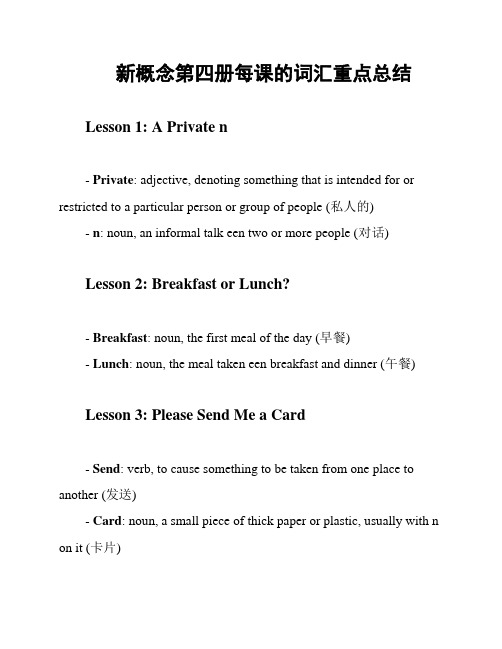
新概念第四册每课的词汇重点总结Lesson 1: A Private n- Private: adjective, denoting something that is intended for or restricted to a particular person or group of people (私人的) - n: noun, an informal talk een two or more people (对话)Lesson 2: Breakfast or Lunch?- Breakfast: noun, the first meal of the day (早餐)- Lunch: noun, the meal taken een breakfast and dinner (午餐)Lesson 3: Please Send Me a Card- Send: verb, to cause something to be taken from one place to another (发送)- Card: noun, a small piece of thick paper or plastic, usually with n on it (卡片)Lesson 4: An Important Letter- Important: adjective, of great significance or value (重要的)- Letter: noun, a written message from one person to another (信件) Lesson 5: Aboard a Train- Aboard: adverb, on a train, ship, aircraft, etc. (在车上)Lesson 6:funny Story- Funny: adjective, causing laughter or amusement (有趣的)- Story: noun, a written or spoken account of events, experiences,or the like (故事)Lesson 7: A Caring Doctor- Caring: adjective, showing kindness, understanding, or concern for other people (关心的)- Doctor: noun, a person who is qualified to practice medicine (医生)Lesson 8: Noisy Neighbors- Noisy: adjective, making a lot of noise (喧闹的)- Neighbor: noun, a person who lives in the same building or area as another person (邻居)Lesson 9: An Accident- Accident: noun, an unexpected event that causes damage, injury, or death (事故)Lesson 10: Alone at Home- Alone: adjective, without anyone else present (独自的)- Home: noun, the place where one lives, especially as a member of a family or household (家)Lesson 11: A False Report- False: adjective, not true or correct (错误的)- Report: noun, a written or spoken statement about something that has happened (报告)Lesson 12: The Channel Tunnel- Channel Tunnel: noun, a tunnel beneath the English Channel, connecting England and France (英法海底隧道)Lesson 13: The Olympic Games- Olympic Games: noun, a sports event held every four years, with participants from all over the world (奥运会)Lesson 14: The Vaccine- Vaccine: noun, a medical substance given to people to prevent (脊髓灰质炎疫苗)Lesson 15: The Moon Landing- Moon Landing: noun, the event of an aircraft landing on the moon (登月)Lesson 16: A Traffic Accident- Traffic Accident: noun, an unexpected event that involves damage, injury, or death due to traffic (交通事故)Lesson 17: Life on Mars?- Life: noun, the state of being alive (生命)- Mars: noun, the fourth from the sun, known as the "Red " (火星)Lesson 18: A Trip to Mars- Trip: noun, a journey to a place, especially a long one (旅行)Lesson 19: The World Cup- World Cup: noun, a sports event held every four years, with participants from all over the world (世界杯)Lesson 20: A Bigger Problem- Bigger: adjective, of greater size, amount, or extent (更大的)Lesson 21: Richard's Dilemma- Dilemma: noun, a n in which it is very difficult to choose what to do, because all the choices are equally unfavorable (困境)Lesson 22: False Pretense- False Pretense: noun, a n where someone pretends to be something or someone they are not (伪装)Lesson 23: No Parking- Parking: noun, the act of ping a vehicle and leaving it unattended in a place where it will not cause a n (停车)Lesson 24: At the Post Office- Post Office: noun, a government agency that provides mail and package delivery services (邮局)。
苏教版牛津英语七年级上册第四单元4food知识点与课文讲解

路漫漫其修远兮,吾将上下而求索- 百度文库Unit4 food一.词组take more exercise 多锻炼walk to school 步行上学three time a week 每周三次keep healthy 保持健康join the army 参军the love of one’s country爱国心want to be 想成为……play cards 玩牌play games 做游戏get …from…从……获得(得到)……would like(sb.)to do sth 想要(某人)干某事less than 不到how much/many 多少keep fit 保持健康not at all 根本不;一点也不feel worried 感到忧虑Good luck with sth/to sb 祝好运be busy doing sth 忙于干……give sb sth.=give sth to sb 给某人某东西二、日常用语We need an egg and a tomato for the soup. 我们需要一只鸡蛋和一个西红柿做汤。
Would you like a glass of water? 你想要杯水吗?Let’s make a pancake.我们做个薄煎饼吧。
How to keep fit? 怎样保持身体健康?三、知识讲解1. Let’s have a hamburger.我们吃个汉堡包。
①let's=let us, let后面用动词原形即Let’s do sth.“让我们干……吧。
”例如:Let’s have a rest.让我们休息一下吧。
Let’s play games.让我们做游戏吧。
〖注意〗let’s开头的祈使句,其反意疑问句在句末加shall we?表示包括听话人在内的一种建议。
如果不表示建议,而是提出一种请求,表示允许,不包括听话人在内时,则let us 不缩写成let’s,其反意疑问句为will you?我们踢篮球,好吗?(表示建议)让我们看看你的图画,可以吗?(表示请求允许)2.have动词,“吃、喝;有”。
新概念英语1-4册单词表带音标

新概念英语1-4册单词表带音标New Concept English 1-4 Word List with PhoneticsUnit 1: Nice to meet you1. alive [əˈlaɪv] adj. 活着的2. almost [ˈɔːlməʊst] adv. 几乎3. already [ɔːlˈredi] adv. 已经4. alright [ɔːlˈraɪt] adj. 好的,可以的5. ambition [æmˈbɪʃn] n. 野心,抱负6. among [əˈmʌŋ] prep. 在……当中7. asleep [əˈsliːp] adj. 睡着的8. attack [əˈtæk] v. 攻击9. aunt [ɑːnt] n. 姑妈,舅妈10. awake [əˈweɪk] adj. 醒着的Unit 2: I'm sorry1. accident [ˈæksɪdənt] n. 意外,事故2. ago [əˈɡəʊ] adv. 以前3. agree [əˈɡriː] v. 同意4. angry [ˈæŋɡri] adj. 生气的5. apology [əˈpɒlədʒi] n. 道歉6. appointment [əˈpɔɪntmənt] n. 约会,预约7. argue [ˈɑːrɡjuː] v. 争论8. army [ˈɑːrmi] n. 军队9. artist [ˈɑːrtɪst] n. 艺术家10. asleep [əˈsliːp] adj. 睡着的Unit 3: I'm really keen on photography1. awful [ˈɔːfl] adj. 糟糕的2. cashier [kæˈʃɪə] n. 收银员3. except [ɪkˈsept] prep. 除了4. experience [ɪkˈspɪəriəns] n. 经验5. keen [kiːn] adj. 热衷的6. photography [fəˈtɒɡrəfi] n. 摄影术7. prison [ˈprɪzn] n. 监狱8. reason [ˈriːzn] n. 原因,理由9. travel [ˈtrævl] v. 旅行10. unhappy [ʌnˈhæpi] adj. 不开心的Unit 4: Have you got anything cheaper?1. anything [ˈeniθɪŋ] pron. 任何东西2. bill [bɪl] n. 账单3. bookshelf [ˈbʊkʃelf] n. 书架4. break [breɪk] v. 打破5. calculator [ˈkælkjʊleɪtər] n. 计算器6. cheaper [ˈtʃiːpə(r)] adj. 更便宜的7. else [els] adv. 其他8. fix [fɪks] v. 修理9. laundry [ˈlɔːndri] n. 洗衣店10. market [ˈmɑːrkɪt] n. 市场Unit 5: This is your bedroom1. bedroom [ˈbedruːm] n. 卧室2. clean [kliːn] v. 清洁3. curtain [ˈkɜːtn] n. 窗帘4. electric [ɪˈlektrɪk] adj. 电的5. floor [flɔːr] n. 地板6. kitchen [ˈkɪtʃɪn] n. 厨房7. light [laɪt] n. 光线8. mirror [ˈmɪrə(r)] n. 镜子9. tidy [ˈtaɪdi] adj. 整齐的10. toothbrush [ˈtuːθbrʌʃ] n. 牙刷Unit 6: What a beautiful sweater!1. beautiful [ˈbjuːtɪfl] adj. 美丽的2. break [breɪk] v. 打破3. choice [tʃɔɪs] n. 选择4. damage [ˈdæmɪdʒ] n. 损坏5. different [ˈdɪfrənt] adj. 不同的6. dye [daɪ] v. 染色7. fix [fɪks] v. 修理8. hole [həʊl] n. 洞9. return [rɪˈtɜːn] v. 退还10. sweater [ˈswetə(r)] n. 毛衣Unit 7: Do you feel like going to that film?1. adventure [ədˈventʃə(r)] n. 冒险2. cinema [ˈsɪnəmə] n. 电影院3. cinema [ˈsɪnəmə] n. 电影院4. come dy [ˈkɒmədi] n. 喜剧5. detective [dɪˈtektɪv] n. 侦探6. dislike [dɪsˈlaɪk] v. 不喜欢7. feel [fiːl] v. 感到8. film [fɪlm] n. 电影9. horror [ˈhɒrə(r)] n. 恐怖10. science [ˈsaɪəns] n. 科学Unit 8: Who broke the vase?1. break [breɪk] v. 打破2. ever [ˈevə(r)] adv. 曾经3. forget [fəˈɡet] v. 忘记4. happen [ˈhæpən] v. 发生5. hopeful [ˈhəʊpfəl] adj. 有希望的6. mistake [mɪˈsteɪk] n. 错误7. remember [rɪˈmembər] v. 记得8. sound [saʊnd] n. 声音9. telephone [ˈtelɪfəʊn] n. 电话10. vase [vɑːz] n. 花瓶Unit 9: I'll help you1. borrow [ˈbɒrəʊ] v. 借2. could [kʊd] modal v. 可以3. few [fjuː] pron. 少数4. help [help] v. 帮助5. honest [ˈɒnɪst] adj. 诚实的6. news [njuːz] n. 新闻7. notice [ˈnəʊtɪs] v. 注意到8. paper [ˈpeɪpə(r)] n. 纸9. remember [rɪˈmembər] v. 记得10. send [send] v. 寄送Unit 10: Language1. chance [tʃɑːns] n. 机会2. choice [tʃɔɪs] n. 选择3. corner [ˈkɔːrnə(r)] n. 角落4. include [ɪnˈkluːd] v. 包括5. language [ˈlæŋɡwɪdʒ] n. 语言6. meet [miːt] v. 认识7. nobody [ˈnəʊbədi] pron. 没有人8. perhaps [pəˈhæps] adv. 也许9. rude [ruːd] adj. 粗鲁的10. simple [ˈsɪmpl] adj. 简单的以上是新概念英语1-4册的部分单词表,带有音标注释。
新概念4A lesson4

1.Writing:
I arrived by train a moment ago. I’ve _________________________.
2. Reading: workaholic:工作狂 -aholic 沉迷于…的人 shopaholic购物狂 alcoholic 酒鬼,酗酒者
Words:
1.amusing: 有趣的 amuse v.娱乐;消遣;使发笑;使愉快 amuse oneself自娱自乐,消遣 amusement n.消遣,娱乐;乐趣 2.rarely:很少的 not often seldom 3.frequently:经常地 FAQ:frequently asked questions
4. What a high mountain ____ ____ ! How high the ______ _____ ! 5. What a hungry boy _____ _____ ! How hungry the _____ ____ !
1.This is a wonderful garden . 2.This is a surprise . 3.He is causing a lot of trouble . 4.They are wonderful actors . 5. She is a hard-working woman . 6. It is a tall building . 7. It is a terrible film . 8. You are a clever boy. 9. She is a pretty girl . 10. He is a strange guy .
4.catch:(caught-caught)赶上 ndlady:女房东 landlord 房东,老板;地主 6.hardly:几乎不 (barely) 7.remark:谈论,评论 remarkable 卓越的;非凡的;值得注意的 remark to sb. about/on sth. 和某人谈论某事 8.at that moment:正在那时
裕兴版新概念英语笔记第一册第4课

Lesson 4 Is this your…?单词讲解[词汇](5)suit n.一套衣服school n.学校teacher n.老师son n.儿子daughter n.女儿★suit n. 一套衣服eg. Is this your suit? 这是你的衣服吗?Yes, it is. 是的,它是的。
eg. I want a man’s suit. 我想要一套男装。
eg. She has a new suit. 她有一套新衣服。
★school n. 学校--at school 在学校求学eg. Her son is at school. 她的儿子在学上校上学。
--go to school 去上学★teacher n. 教师--teach v. 教书--teach + er = teacher--sing v. 唱歌--sing + er = singer 歌手,歌唱家--drive v. 驾驶--drive + r = driver 司机★son n. 儿子eg. My son is very strong. 我的儿子长得很壮。
eg. Is your son a teacher? 你的儿子是教师吗?Yes, he is/ No, he isn’t. (he代son, he为主格,指代男性的“他”)★daughter n. 女儿eg. My daughter is very lovely. 我的女儿非常可爱。
(lovely可爱的,漂亮的)eg. His daughter isn’t a student. She is a singer. 他的女儿不是一名学生,她是一名歌手。
(she代his daughter, she 为女性“她”的主格)Exercise—翻译1. 这是你的女儿吗?是的,她是。
Is this your daughter? Yes, she is.2. 那是他的小汽车吗?不,不是,是我的小汽车。
英语第四模块语法总结

Module 4Unit 11.food: 通常作不可数名词,意为“食物,食品”E.g. Let’s go to buy some food. 我们去买些食物吧。
拓展:表特定种类的食物时,food用作可数名词,foodsfrozen foods 冷冻食物2.drink: 1)不可数名词,饮料,e.g. Have you got any drink?你有饮料吗?拓展:指不同种类的饮料时,为可数e.g. Cola isn’t a health drink.2) 动词,喝,饮,e.g. I want to drink some water.3.candy:1) 作不可数名词,糖果e.g. I like eating candy very much.作可数名词,一块糖果e.g. We’ve got a bag of candies.2) candy:美式英语sweet:英式英语sugar: 泛指“糖”,不可数名词4.fruit: 1) 不可数名词,指水果总称;e.g. Do you like fruit?(泛指水果)2)可数名词,指水果的种类或个别水果e.g. I like to eat apples, bananas and other fruits.(强调种类)5.chicken: 1)不可数,鸡肉e.g. Chicken is healthy food, and I like eating it.2) 可数,小鸡e.g. We can see some chickens on the farm.6.We haven’t got any meat. 我们没有肉了。
Haven’t 是have not 的缩写,have在此处为助动词,用于have got 结构中,意为“有,拥有”当主语是第三人称单数时,have变为hase.g. We’ve got lots of books. (We’ve=We have)Has he got a football?他有一个足球吗?7. some和any的用法1) some和any 既可修饰可数名词又可修饰不可数名词, some常用在肯定句中, 而any则常用在否定和疑问句中。
新概念英语青少版入门B-U7知识要点

新概念英语入门级B单元附纸Unit7一、四会单词。
(要求:会读、会认、会默、会用)1、box (复数boxes) 盒子2、cherry(复数cherries) 樱桃3、dish(复数dishes) 盘子4、food(不可数名词) 食物5、fork(复数forks) 叉子6、glass(复数glasses) 玻璃杯7、knife(复数knives) 小刀8、sandwich(复数sandwiches) 三明治9、strawberry(复数strawberries) 草莓10、bamboo(不可数名词) 竹子11、peach(复数peaches) 桃子12、potato(复数potatoes) 土豆二、巩固已学单词和词组。
(要求:会读、会认、会默、会用)1、what 什么2、are 是3、is 是4、this 这(个)5、that 那(个)6、these 这些7、those 那些8、they 它们、他们9、it 它10、it is=it’s 它是11、they are=they’re 它们是、他们是12、this is 这(个)是13、that is=that’s 那(个)是14、these are 这些是15、those are 那些是16、but 但是三、句子。
(要求:会读、会认、会默、会用)1、Here you are, Mum! 给你,妈妈。
2、--What’s this? --It’s a fork.\ This is a fork. 这是什么?它(那)是叉子。
3、--What’s that? --It’s a knife.\ That’s a knife. 那是什么?它(那)是小刀。
4、--What are these? 这些是什么?--They are glasses and dishes. \These are glasses and dishes.它们(这些)是玻璃杯和盘子。
5、--What are those? 那些是什么?--They’re strawberries. \Those are strawberries. 它们(那些)是草莓。
新概念英语1-4册笔记
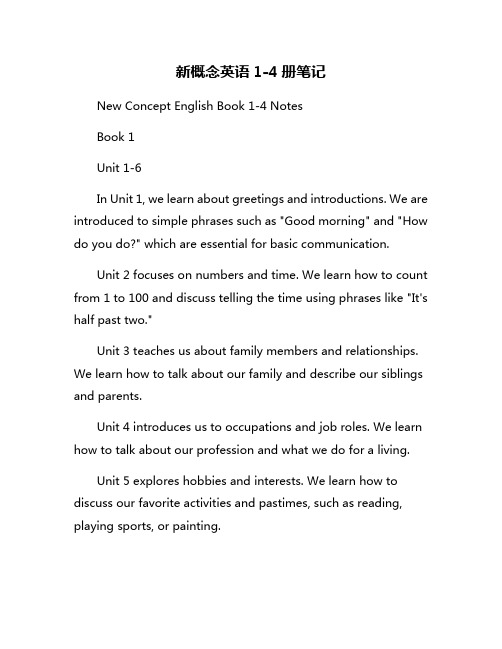
新概念英语1-4册笔记New Concept English Book 1-4 NotesBook 1Unit 1-6In Unit 1, we learn about greetings and introductions. We are introduced to simple phrases such as "Good morning" and "How do you do?" which are essential for basic communication.Unit 2 focuses on numbers and time. We learn how to count from 1 to 100 and discuss telling the time using phrases like "It's half past two."Unit 3 teaches us about family members and relationships. We learn how to talk about our family and describe our siblings and parents.Unit 4 introduces us to occupations and job roles. We learn how to talk about our profession and what we do for a living.Unit 5 explores hobbies and interests. We learn how to discuss our favorite activities and pastimes, such as reading, playing sports, or painting.Unit 6 delves into daily routines and schedules. We discuss our typical day and the various tasks we perform at different times.Book 2Unit 7-12In Unit 7, we learn about food and drink. We discuss different types of cuisine and how to order food in a restaurant.Unit 8 focuses on shopping habits and preferences. We learn how to ask for the price of an item and negotiate discounts.Unit 9 teaches us about transportation and travel. We learn how to book tickets and ask for directions.Unit 10 introduces us to the weather and climate. We discuss different seasons and how to talk about the weather forecast.Unit 11 explores holidays and celebrations. We talk about different festivals and traditions from around the world.Unit 12 delves into health and fitness. We learn how to describe common ailments and discuss physical activities to stay fit.Book 3Unit 13-18In Unit 13, we learn about household chores and responsibilities. We discuss tasks such as cooking, cleaning, and laundry.Unit 14 focuses on the environment and conservation. We talk about recycling, pollution, and conservation efforts.Unit 15 teaches us about technology and communication. We discuss the internet, smartphones, and social media platforms.Unit 16 introduces us to the arts and culture. We learn about famous artists, musicians, and writers.Unit 17 explores education and learning. We discuss different educational systems and techniques for studying effectively.Unit 18 delves into global issues and politics. We talk about current events, international relations, and global challenges.Book 4Unit 19-24In Unit 19, we learn about work culture and office etiquette. We discuss workplace communication and professionalism.Unit 20 focuses on business and entrepreneurship. We learn about starting a business, marketing strategies, and financial planning.Unit 21 teaches us about leadership and management. We discuss different leadership styles and effective team management.Unit 22 introduces us to economics and finance. We talk about market trends, investments, and economic indicators.Unit 23 explores social issues and human rights. We learn about equality, discrimination, and advocacy for marginalized groups.Unit 24 delves into personal development andself-improvement. We discuss goal setting, time management, and strategies for personal growth.Overall, the New Concept English Book series provides a comprehensive overview of essential English language skills and topics for everyday communication. By studying these books, learners can improve their vocabulary, grammar, and conversational abilities in English.。
新概念4B Unit40_food_and_talk_

Lamplight Beef(灯影牛肉)
• 此菜用牛后腿的腱子 肉,经切片、腌、凉 、烘、蒸、炸、炒等 七道操作工序,制法 考究,技术性强。成 菜色泽红亮,麻辣干 香,回味无穷,因其 肉片薄能透影而得名。
回锅肉 saute pork in hot sauce
Roast Beijing duck
The west
Knives and forks
One’s own plate Completely finished
Chopsticks
Everyone shares Over ordered
Sharing
Food amount
Dish order Cold dishes/meat or vegetable courses/soup/main food
• If you are invited to have dinner in a foreigner’s family, what will you do if you are not sure what to do? • Always follow the host/hostess. • When in Rome, do as the Romans do.
salad
coffee
pizza
sushi
hot dog
What is your favorite Western food or snacks?
Do you know any western table manners?
How is the table laid ?
How to lay the table?
Hosts
Put food into the plates of their guests
新概念英语第4册课文

新概念第四册课文Lesson 1 Finding Fossil man1.词汇•read:read out= read aloud:Please read out the names on the list.read up:to study or learn by reading:Read up on the places you plan to visit before you travel.•geopolitics:研究政治、地理、人口和经济之间关系的学科,尤其着眼于一个国家的外交政策;生存空间说:一种法西斯学说,以地理、经济和政治的需要证明其侵略和掠夺别国是正确的:西方国家制定国家政治、军事战略和对外政策的一种理论依据。
地缘政治学产生于19世纪末,1897年德国地理学家F·拉采尔在其《政治地理学》一书中,提出“国家有机体学说”。
发表了“生存空间论”一文,认为国家就象有机体一样有兴盛、衰亡的过程,国家的兴盛需要有广阔空间。
1917年端典政治地理学家R·谢伦接受了拉采尔的思想,首次提出了地缘政治学一词。
德国的K·豪斯霍弗在第一次世界大战后,提出德国缺乏必要的生存空间和足够的自然资源,主张重新分配世界领土,而战争是解决生存空间的唯一途径等错误的地缘政治论点,为德国法西斯的扩张服务,遭到地理学界的摈弃,并因此使地缘政治学一度声名狼藉。
地缘政治学从其产生到现在形成主要的理论有:1890年美国海军理论家A·T·马汉,在其《海权历史的影响,1660—1783》一书中提出的“制海权”理论,他认为,谁能控制海洋,谁就能为世界强国;而控制海洋的关键在于对世界重要海道和海峡的控制。
1914年英国地理学家H·J·麦金德提出的“大陆心脏说”,认为谁控制东欧,谁就能统治亚欧大陆心脏,谁控制亚欧大陆地带,谁就能统治世界岛,从而主宰世界。
被称之为“陆权派”,代表作是《历史的地理枢纽》。
新概念第四册课文翻译及学习笔记Lesson4
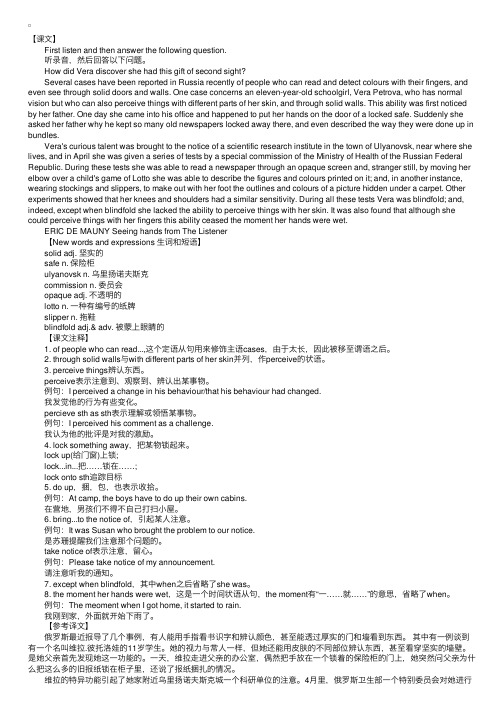
【课⽂】 First listen and then answer the following question. 听录⾳,然后回答以下问题。
How did Vera discover she had this gift of second sight? Several cases have been reported in Russia recently of people who can read and detect colours with their fingers, and even see through solid doors and walls. One case concerns an eleven-year-old schoolgirl, Vera Petrova, who has normal vision but who can also perceive things with different parts of her skin, and through solid walls. This ability was first noticed by her father. One day she came into his office and happened to put her hands on the door of a locked safe. Suddenly she asked her father why he kept so many old newspapers locked away there, and even described the way they were done up in bundles. Vera's curious talent was brought to the notice of a scientific research institute in the town of Ulyanovsk, near where she lives, and in April she was given a series of tests by a special commission of the Ministry of Health of the Russian Federal Republic. During these tests she was able to read a newspaper through an opaque screen and, stranger still, by moving her elbow over a child's game of Lotto she was able to describe the figures and colours printed on it; and, in another instance, wearing stockings and slippers, to make out with her foot the outlines and colours of a picture hidden under a carpet. Other experiments showed that her knees and shoulders had a similar sensitivity. During all these tests Vera was blindfold; and, indeed, except when blindfold she lacked the ability to perceive things with her skin. It was also found that although she could perceive things with her fingers this ability ceased the moment her hands were wet. ERIC DE MAUNY Seeing hands from The Listener 【New words and expressions ⽣词和短语】 solid adj. 坚实的 safe n. 保险柜 ulyanovsk n. 乌⾥扬诺夫斯克 commission n. 委员会 opaque adj. 不透明的 lotto n. ⼀种有编号的纸牌 slipper n. 拖鞋 blindfold adj.& adv. 被蒙上眼睛的 【课⽂注释】 1. of people who can read...,这个定语从句⽤来修饰主语cases,由于太长,因此被移⾄谓语之后。
- 1、下载文档前请自行甄别文档内容的完整性,平台不提供额外的编辑、内容补充、找答案等附加服务。
- 2、"仅部分预览"的文档,不可在线预览部分如存在完整性等问题,可反馈申请退款(可完整预览的文档不适用该条件!)。
- 3、如文档侵犯您的权益,请联系客服反馈,我们会尽快为您处理(人工客服工作时间:9:00-18:30)。
FoodsInteractive questions and answersI’m so hungry I could eat a horse. Lunch will be ready in a minute.What sort of food do you prefer, sweet or spicy? I prefer sweet food.Which food do you like best? Fried chicken is my favorite food.You eat too ma ny spicy dishes. That’s not good for your stomach.I know but I can’t help eating spicy food whenever I have the chance.How do you like Chongqing dishes?I don’t like Chongqing dishes. They’re too spicy. What kind of ice cream do you like? I like vanilla ice cream.Do you like seafood? Oh yes, I love it.Do you like to eat fruit? Yes, people believe apples are good for our health, so I like apples best.I don’t care for starches. But they give us energy.I hate carrots. They contain a lot of vitamins to make you as fit as a fiddle.I’ve had a sore throat for the past few days. Do you feel hot? I suggest you eat some cool fruit, like pears or pineapples.My husband drinks a lot, so I’m so worried about his health. Get him to stop drinking. Also, cabbage and fish would be good for him. It’s said they can reduce the chance of developing cancer.I see that you always bring a box of milk for breakfast. Yes, I drink milk every day because the protein and vitamins in it can protect my eyesight.You really are a pic ky eater. That’s bad for your health. I know but I really can’t bear food like carrots and tofu.How does it taste?It’s absolutely divine.What kind of seasonings did you use? A little bit of this and that.Is it too salty? Not at all. In fact, I think it could use more salt.How much pepper should I add? Just a pinch.What do you feel like eating? I feel like Chinese tonight.What is your favorite snack? I really like traditional Sichuan sausage.What do you eat more often, rice or bread? I usually have rice.What is a typical food in your country? Our staple is rice.What kinds of healthy foods and drinks do you usually have? Coffee and berries. Drinking two or three cups of coffee a day is good for the brain.What food relieves tiredness? Bananas. Having a banana with breakfast can help get rid of your tiredness.What are healthy foods? There are many healthy foods, for example, oatmeal. Frequent sentencesFired chicken is my favorite food.My sister has a sweet tooth.I am fond of vinegary food.I only eat vegetarian food.I live for cookies.I’m addicted to coffee.I don’t care for chocolate.My son is a picky eater.I have never touched meat.I am used to having breakfast at my office.My son used to watch TV during dinner.They are used to having salad after dinner or ice cream for desert.I am not accustomed to eating with my hand.I’m left-handed so I often take the leftmost seat at the table.Don’t put your elbows on the table.Don’t talk with your mouth full.Don’t read at the table.No TV during dinner.Wipe your mouth.Put your napkin on your lap.Situational dialogue1A: My food is a little greasy. What about yours?B: Mine is a little dry. I wonder what the chef is thinking?A: I don’t know. The last time I ate here, my steak was really tou gh, too.B: Mine was tender, but my potato was as hard as a rock! Why are we here?2A: Have you got the salt at your end of the table, Steve?B: What are you looking for?A: The salt.B: Salt, salt. Oh, yes. Here it is. And would you pass me the mustard? This is delicious beef.A: Sure. Would you like some more? Have more potatoes. Some more meat? A piece of bread?B: No, thanks. That was lovely, but I’ve had enough. Really, I’ll have another glass of wine, perhaps.A: Here you are.B: Thanks.3A: Chinese dumplings are my favorite food. Could you tell me how to make them? B: Sure. First, mix a little water with some wheat flour, and stir it until it becomes apiece of dough. You should also prepare some filling, which can be vegetable or meat. A: Then what should I do with the dough and filling?B: Cut the dough into many small pieces, then roll them with a rolling pin into round, thin wrappers.A: How thin should the wrappers be?B: It’s up to you. You only need to make sure that the dumplings won’t b urst when you boil them. Many Chinese like thin wrappers.A: I see. What should I do next?B: Next, put some filling in the center of a wrapper and fold it up. The last thing to do is to boil them.A: It’s easier said than done, isn’t it?B: Yes, it is. In northern China, dumplings are dipped in vinegar and soy sauce, and eaten with a piece of raw garlic.A: Thank you. I’m going to try to make some right now.。
